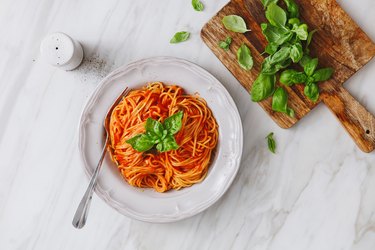
Gastroenteritis is an infection in the stomach and intestines that causes nausea, vomiting and diarrhea. Gastroenteritis related to food is commonly the result of food poisoning — such as stomach pain after eating tomato sauce.
A food allergy can cause symptoms similar to gastroenteritis, although there is no actual infection. Pasta sauces may contain milk, fish and tomatoes that could trigger an allergic reaction. If you develop stomach pain after eating pasta sauce, you need to see your doctor to determine the cause of your symptoms.
Video of the Day
Video of the Day
Tomato Sauce and Upset Stomach
Gastroenteritis that develops after eating pasta sauce is most likely caused by food poisoning. After you eat pasta sauce that's contaminated with an infectious organism, the lining of your stomach and intestines will become infected and inflamed, according to Cleveland Clinic.
Pasta sauce can become contaminated during the manufacturing process or during the preparation before serving it from contaminated utensils or cookware. If you refrigerate and reheat the pasta sauce multiple times, you're at a greater risk of developing food poisoning.
Recognize the Symptoms
The type of organism that has contaminated the pasta sauce will determine the severity and longevity of the symptoms. Most symptoms will appear within a few hours after you eat contaminated pasta sauce.
According to the U.S. Department of Health and Human Services, the bacteria Bacillus cereus is common in sauces that have been left out at room temperature for too long. This bacteria often causes diarrheal symptoms six to 15 hours after eating, or vomiting symptoms 30 minutes to six hours after eating the affected sauce.
The most common symptoms of gastroenteritis from food poisoning include nausea, vomiting, abdominal pain, fever, fatigue, loss of appetite, stomach cramps and watery diarrhea after eating spaghetti sauce. Call your doctor if you notice blood in your vomit or stool, as this may be a sign of a more serious condition.
Be Aware of Allergic Reaction
An allergic reaction to one or more of the ingredients in the pasta sauce can cause inflammation in the digestive system. Pasta sauces may contain fish, dairy and tomatoes.
These foods can trigger an allergic reaction. If you're allergic to an ingredient in the sauce, your immune system will overreact to the proteins in that ingredient, triggering the production of immunoglobulin E antibodies. These allergy-provoking agents cause the production of histamine in your intestines, which can cause common gastroenteritis symptoms.
Allergic reactions can potentially be life-threatening. Seek immediate medical attention if you experience any severe symptoms, such as shortness of breath, wheezing, dizziness, tightening of your throat, swelling in your face or throat, or repetitive vomiting or diarrhea, according to Food Allergy Research & Education.
Treat Your Condition
The main concern with treating gastroenteritis is to maintain proper hydration. Gastroenteritis can cause excessive vomiting and diarrhea, which can deplete the body of essential fluids. Drink more clear liquids and eat foods that are bland and will promote bulk-forming stool, such as white rice, bananas, white bread, plain yogurt and apple sauce. If you notice symptoms of dehydration, such as dry mouth, dry skin and feeling lethargic, call your doctor right away.